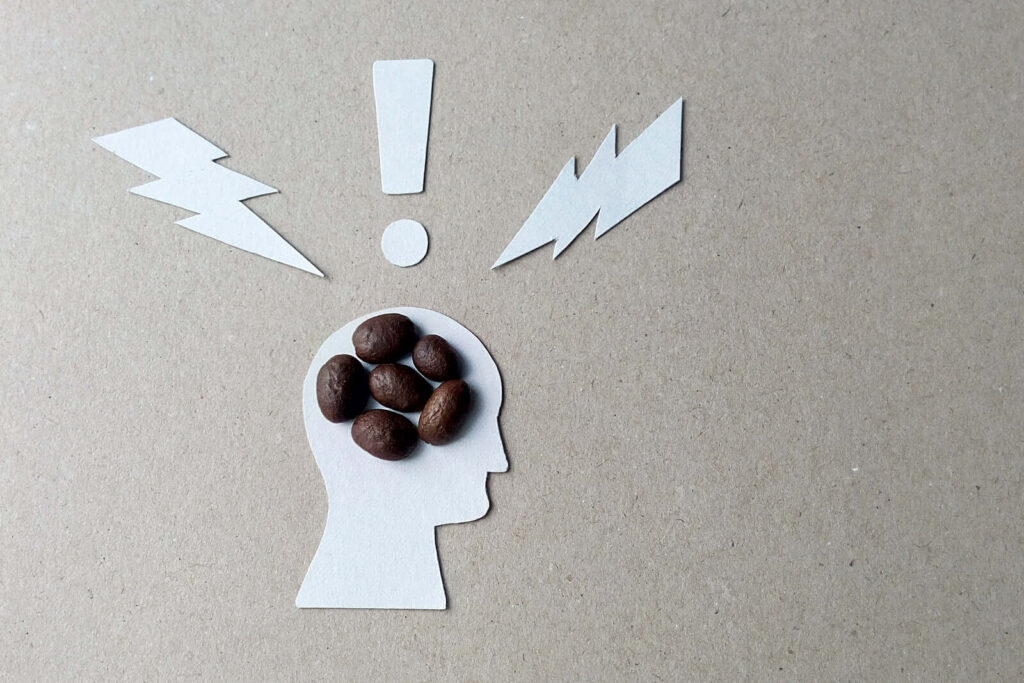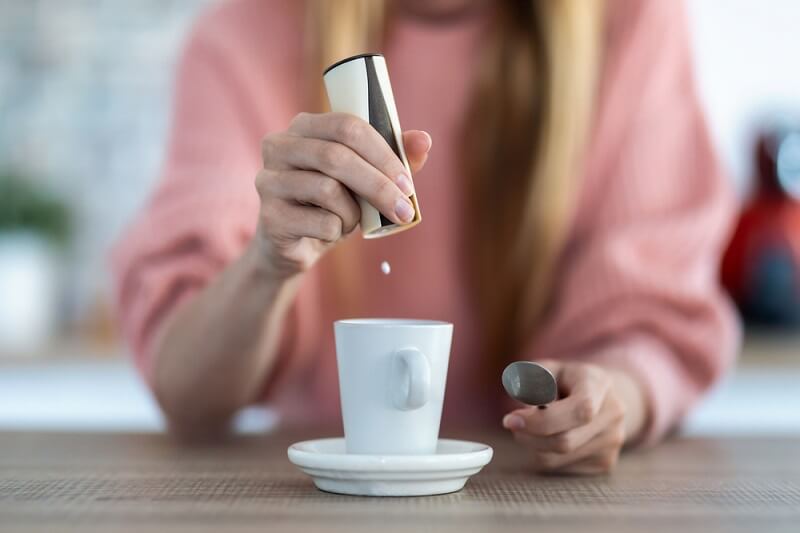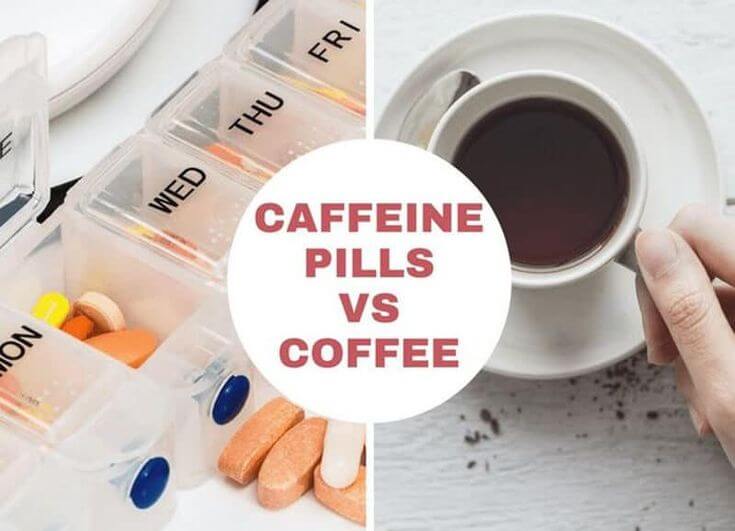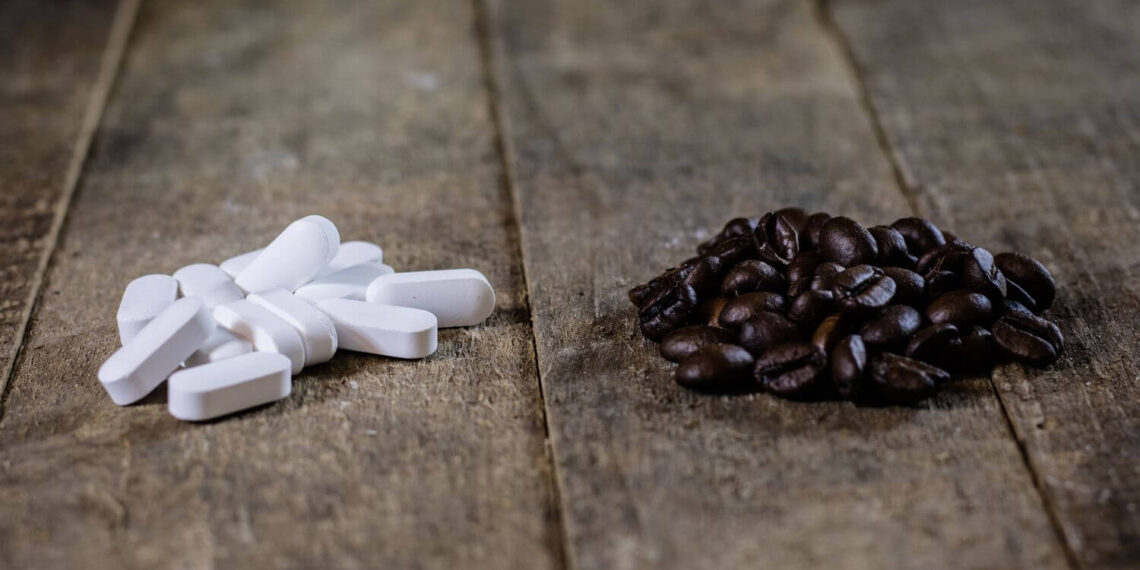The duration of caffeine pills’ effect compared to coffee varies based on the brand and dosage. These pills can temporarily boost energy, memory, and focus. It takes approximately 45 minutes after ingestion for the effects to kick in.
CUPERTINO, CALIFORNIA | NOW THEN DIGITAL — Caffeine, a natural stimulant found in various beverages like tea, chocolate, and coffee, is present in both caffeine pills and the popular beverage itself.
Many individuals opt for caffeine pills to temporarily enhance their energy levels and focus during work or study sessions. On the other hand, coffee remains a widely consumed beverage across the globe.

Generally, caffeine pills contain 100-200 mg per serving, allowing individuals to consume up to 400 mg daily without experiencing adverse side effects. Moreover, many caffeine pills actually contain more caffeine than a typical cup of coffee which contains around 80-100 mg in an 8-ounce serving.
Benefits and Side Effects
Both caffeine pills and coffee offer benefits and have side effects. Caffeine enhances alertness, improves physical performance, and boosts energy levels. However, excessive consumption of caffeine may lead to adverse effects such as anxiety, nervousness, headaches, tremors, or shaking.
Coffee is associated with a multitude of potential health benefits. These include bolstering brain function, aiding in weight management, reducing the risk of type 2 diabetes and depression. Nevertheless, excessive coffee consumption can result in adverse effects such as sleeplessness, restlessness, irritability, and muscle tremors.
Which is Better?
When comparing caffeine pills to coffee, it becomes evident that coffee possesses an advantage over its tablet counterpart due to its health benefits. Unlike caffeine tablets, coffee contains valuable antioxidants and essential nutrients.
Furthermore, the ease of ingesting an excessive amount of caffeine through pills can lead to adverse effects such as irritability, jitters, or a rapid heart rate.
Caffeine pills offer a more affordable and convenient option without any taste or stomach discomfort. In contrast, coffee provides an experiential aspect with its delightful flavors and various brewing methods.
L-Theanine helps relieve caffeine jitters
L-Theanine is often referred to as the sidekick of caffeine. It works by reducing the jitters and crashes that can result from caffeine intake.
This substance belongs to the amino acid family, which are made up of nitrogen, hydrogen, and oxygen. These compounds serve as building blocks of proteins.
They help keep our nervous system calm during times of stress.
L-Theanine helps relieve these side effects by acting as an inhibitor to GABA receptors, which means less CNS activity and a more calming feeling.
Studies have shown that L-theanine can reduce the effects of other stimulants. This supplement may reduce the jittering effects of caffeine pills.
It has also been shown to counteract the effects of ephedrine and diethylpropion.
L-theanine may help reduce the effects of guarana and yerba mate, which are both stimulants.
Caffeine pills contain more than coffee

Although you can drink coffee to get a boost of energy, caffeine pills contain more than coffee. These pills contain more than 200 milligrams of caffeine per tablet, which can be more than enough for your daily caffeine intake.
However, they don’t have the coffee taste or bitterness, and may also contain inactive ingredients, such as coloring agents, emulsifiers, and other additives.
While caffeine pills can give you the same boost as coffee, they are often more convenient. Taking them may give you jitters, but they are far less harmful than the beverage itself.
The main difference between liquid and pill caffeine products is their dosage. A teaspoon of pure powdered caffeine contains the equivalent of more than 20 cups of coffee.
Both have similar caffeine levels, so the pill is more convenient.
However, powdered products can be harder to find and require extra precision and tools to take. If safety is your top priority, caffeine pills are better for you.
When deciding which caffeine product to choose, keep in mind that pills are less expensive and more convenient than liquid forms.
They are cheaper
One of the biggest differences between caffeine pills and energy drinks is price.
Energy drinks are overpriced and contain only about 200 milligrams of caffeine, which is not enough to give you a boost.
Caffeine pills contain a similar amount of caffeine, but are much cheaper. Moreover, you can get a variety of flavors. Caffeine pills can dissolve in water, allowing you to drink them throughout the day.
A bottle of caffeine pills costs less than a cup of coffee. Depending on the seller, you can get a bottle of 100 pills for under $10.
A single pill contains more than four milligrams of caffeine, which means you can take several more as needed.
Compared to drinking coffee, you won’t stain your teeth, either. Caffeine pills also provide the same amount of caffeine as a cup of coffee.
They contain less caffeine than energy drinks
These drinks are high in caffeine, but they contain less than the label says. Rockstar, for example, has 229 milligrams of caffeine per ounce – that’s almost double the caffeine in an espresso.
In the US, energy drinks cause about 20,000 emergency room visits a year – and one out of every 10 people will end up in the hospital.
Approximately 8,000 of these visits are from people who combine energy drinks with alcohol or other drugs.
Energy drinks contain an extensive list of ingredients. They also usually contain added calcium and vitamins that your body doesn’t absorb as well as whole foods.
A grande cup of Starbucks coffee contains 225 mg of caffeine – the equivalent of four regular cups. So, to reach the recommended 400 milligrams a day, you’d need four cups of coffee a day.
That’s about twice as much as the recommended limit.
They may increase urine output
Several factors are responsible for low urine output. Some are a result of poor diet while others are due to the body’s rapid excretion of fluids.
A healthy person has approximately 60% water, so dehydration could result in a low urine output.
However, there are some things you can do to prevent dehydration and increase urine output. Listed below are some tips to increase urine output. And don’t forget to stay hydrated!
Diabetic drugs and calcium channel blockers can cause increased urine output. Calcium channel blockers open blood vessels, allowing more water to leave the body.
Diuretics increase urine output and can also increase thirst.
Some medications may increase urine output by inhibiting the production of ADH, which helps the kidneys to move water out of the body.
Some medications, like lithium, may also increase urine output. To treat polyuria, doctors will look for signs that your thirst is excessive.
How Does the Amount of Caffeine in a Pill Compare to That in a Cup of Coffee

The caffeine content in different brands and types of coffee pills can vary compared to that in a cup of coffee. Generally, caffeine pills contain 100 to 200 milligrams (mg) of caffeine per tablet. Conversely, the amount of caffeine in a cup of coffee can vary based on factors like type, serving size, and bean variety.
A typical 8-ounce cup provides around 80–100 mg of caffeine, but this value may range from almost zero to over 500 mg depending on the specific coffee drink and brewing method.
It should be noted that consuming caffeine pills can lead to excessive intake of caffeine, resulting in side effects such as irritability, jitters, or a rapid heart rate. In contrast, coffee offers antioxidants and other nutrients not present in caffeine tablets. Additionally, monitoring caffeine consumption becomes more manageable when opting for coffee.
The decision between caffeine pills and coffee ultimately comes down to personal preference and lifestyle. Caffeine pills offer affordability, speed, and eliminate any issues with taste or stomach discomfort.
On the other hand, coffee provides a multitude of brewing methods, flavor profiles, and potential health benefits. It is crucial to monitor your own reaction to caffeine in order to determine your tolerance levels and prevent excessive consumption that may lead to adverse side effects.
To increase alertness, improve physical work, and boost energy levels, both caffeine pills and coffee can be utilized. However, it is essential to consider the caffeine content in each and assess your personal response to determine which option suits you best. In summary, while both options have their merits, individual monitoring is crucial for optimizing your choice.
Potential Side Effects of Caffeine Pills

Caffeine pills serve as a popular method to enhance short-term energy and focus, commonly utilized during work or study. Nonetheless, akin to any other medication, caffeine pills possess potential side effects that should be taken into account by users. Here are several search results that furnish information regarding the probable adverse reactions of caffeine pills.
The FDA issues a warning to consumers regarding dietary supplements containing pure or highly concentrated caffeine. It strongly advises against the use of these products, especially those in powdered or liquid forms, sold in large containers directly to consumers.
The FDA recently reported two deaths linked to these substances, alarming considering the victims were otherwise healthy individuals. Symptoms of caffeine overdose may include an abnormal and rapidly beating heart, seizures, and even death.
Additionally, excessive caffeine intake can lead to vomiting, diarrhea, stupor, and disorientation—symptoms that tend to be more severe than those resulting from consumption of coffee, tea, or other caffeinated beverages.
The Mayo Clinic advises that excessive caffeine consumption can lead to various side effects, including nervousness, irritability, sleeplessness, and a rapid heartbeat. It is important to note that other unlisted side effects may also arise.
According to Medical News Today, consuming high doses of caffeine can lead to side effects and may not be suitable for everyone. While caffeine pills might aid in studying or staying awake, they also increase the risk of a caffeine overdose by facilitating quicker absorption. This overdose can result in symptoms such as anxiety, rapid heart rate, and other adverse effects.
It is essential to note that excessive consumption of caffeine or having a sensitivity to it can contribute to these negative effects, including anxiety, nervousness, diarrhea, dizziness, dysphoria (a feeling of unhappiness), elevated heart rate, headache, and heartburn.
WebMD states that caffeine pills, like other forms of caffeine, may cause side effects if consumed excessively. These side effects include acid reflux, anxiety, diarrhea, dizziness, excessive thirst, headaches, insomnia, nausea, racing heart rate, shivering, sleep paralysis unhappiness, and vomiting.
Furthermore, caffeine pills can be addictive due to the stimulant properties of caffeine. If taken regularly, dependency may develop. When discontinuing use, withdrawal symptoms such as dizziness, headaches nervousness and fatigue may occur.
In conclusion, the consumption of caffeine pills can lead to a range of side effects. These include feelings of anxiety, nervousness, difficulty sleeping, an accelerated heartbeat, diarrhea, headaches, and vomiting. It is crucial to be aware that overdosing on caffeine pills can have life-threatening consequences. In such cases, individuals may experience seizures, disorientation or even death.
To ensure personal safety and well-being, it is recommended to closely monitor your own reaction to caffeine and determine your individual tolerance level. Avoid excessive caffeine intake as it could trigger adverse effects. Should you encounter any negative reactions from consuming caffeine pills, seeking immediate medical attention is strongly advised.
Conclusion
Both caffeine pills and coffee have the ability to enhance alertness, facilitate physical work, and elevate energy levels. However, consuming excessive amounts of caffeine can result in adverse effects, so it is crucial to monitor your personal response in order to determine your tolerance level.
While coffee offers more health benefits compared to caffeine pills, the latter are more cost-effective and provide a quicker consumption method. Ultimately, the preference between caffeine pills and coffee depends on personal choice and lifestyle considerations.
Editor’s Note: Please contact press@nowthendigital.com if you find any of the content to be inaccurate or outdated.
You’re reading nowthendigital.com — which breaks the news about Uganda, Kenya, Nigeria, South Africa and the rest of the world, day after day. Be sure to check out our homepage for all the latest news, and follow NOW THEN DIGITAL on YouTube, Google, Web Stories, Google News, Medium, LinkedIn, Twitter, Reddit, Pinterest, Linktr, Buy Me a Coffee, Truth Social, and Flipboard to stay in the loop.













